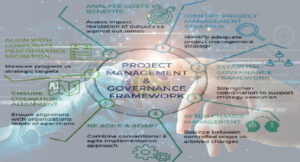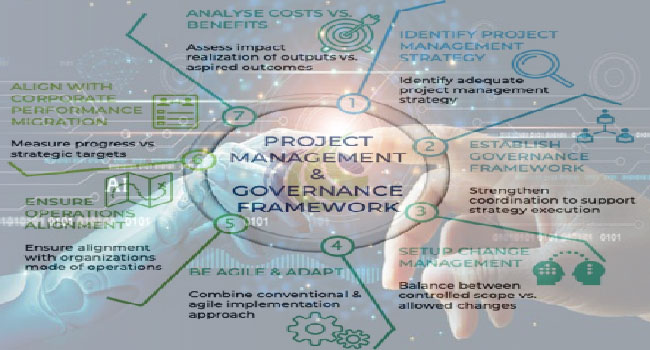I have been hosting Project Management Office (PMO) breakfast meetings for the PMI Silicon Valley chapter for quite some time. Our recent gathering with a few leaders sparked a dynamic conversation that is top of mind for every organization: How does Generative AI (Gen. AI) fundamentally enhance the PMO’s structure and governance?
 The consensus was clear: Gen AI isn’t just a new feature in project tools; it’s an opportunity to transform the PMO from a center of administration into an actual engine of strategic adoption and execution. The potential to automate, predict, and increase the core PMO functions is immense, but we need a unified approach to get there.
The consensus was clear: Gen AI isn’t just a new feature in project tools; it’s an opportunity to transform the PMO from a center of administration into an actual engine of strategic adoption and execution. The potential to automate, predict, and increase the core PMO functions is immense, but we need a unified approach to get there.
We want to open this discussion to a broader community of PM leaders. What are you building? What are you challenging? Join the conversation by commenting below!
Gen. AI’s Impact from Automation to Augmentation
Our discussion highlighted several key areas where Gen. AI is already changing the game or holds considerable offerings. We’re looking to confirm if these themes resonate with your experiences:
- Elevating Governance and Compliance:
Gen. AI can fork the tedious but critical governance process into a streamlined, high-value function.
 Most organizations lose valuable lessons the moment a project closes. Gen AI can help reverse that. By mining past charters, risk logs, and retrospectives, it can build a living knowledge base, “PMO memory,” that surfaces relevant insights whenever a new project starts. Ex: Picture a new Enterprise Resource Planning (ERP) rollout where the system automatically presents the top five risks and mitigation tactics learned from similar programs. This is not data science fiction; it’s what knowledge graphs and Gen AI summarization already make possible today.
Most organizations lose valuable lessons the moment a project closes. Gen AI can help reverse that. By mining past charters, risk logs, and retrospectives, it can build a living knowledge base, “PMO memory,” that surfaces relevant insights whenever a new project starts. Ex: Picture a new Enterprise Resource Planning (ERP) rollout where the system automatically presents the top five risks and mitigation tactics learned from similar programs. This is not data science fiction; it’s what knowledge graphs and Gen AI summarization already make possible today.- Intelligent Coaching & Compliance: We discussed creating applications to coach PMO members on internal governance criteria and process controls. Imagine an AI assistant that instantly reviews a Project Charter against organizational policy and provides real-time, context-specific feedback.
- Documentation & Knowledge Transfer: Gen AI excels at creating/adding documentation to the organizational information system and archive. It can automatically summarize meeting minutes, distill key decisions into a ‘Decision Log’ entry, or convert a complex technical spec into a non-technical executive summary.
- Creative Process Exploration: Beyond simple automation, Gen AI can assist in logistical processes and change management, rapidly generating and assessing potential solutions for bottlenecks, communication plans, or resource conflicts.
- Strategic Insights and Foresight:
The strategic value of Gen. AI lies in its ability to process vast amounts of data at a scale faster than humans can, giving the PMO unparalleled foresight. For Example, one of the most overlooked opportunities is using Gen AI for decision intelligence. PMOs sit on years of data, schedules, budgets, and staffing patterns, but most of it remains underused. Imagine being able to run “what-if” simulations in minutes:
- What if we move 20% of the budget from Program A to Program B?
- What happens to delivery timelines if a key vendor slips by three weeks?
GenAI can analyze those trade-offs instantly, giving leaders evidence-based options instead of gut-driven debates. This is where the PMO becomes a strategic partner, not a reporting body. - Predictive Risk and Quality: In technical domains, AI-driven tools can likely analyze 10,000+ lines of code to identify bugs, dependencies, or architectural risks before they manifest as project delays. This shifts the PMO from reactive reporting to proactive predictive risk management.
- Rapid Research and Enhancement: Project Managers can use AI-driven tools to search for the necessary materials to manage a PMO, compile best practices, and gather information from other PMO teams, enabling faster process improvement than any human-led research initiative.
The PMO’s Next Big Project is an AI-built Business Plan
We agreed that leveraging Gen AI requires the PMO to take the lead. This is not just an IT project; it’s a strategic transformation.
The PMO needs a business plan to incorporate Gen. AI into its strategy. The plan should define the vision, outline business needs, articulate expected value (ROI), manage risks, and shape an adoption roadmap.
- Governance for Gen AI Initiatives and how to engage the PMO managing these initiatives effectively! The PMO is distinctively positioned to manage the risks and dependencies of Gen. AI-enhanced projects, ensuring they align with strategic goals and adhere to ethical and security standards (including the protection of trade secrets, a critical new governance dimension).
 Also, as PMOs adopt AI, governance needs a refresh. Traditional methods focus on schedule and budget compliance, but Gen AI adds new responsibilities: data integrity, transparency, and ethical use. A practical step is to introduce a simple “AI Governance Charter.” It doesn’t have to be bureaucratic just clear accountability for:
Also, as PMOs adopt AI, governance needs a refresh. Traditional methods focus on schedule and budget compliance, but Gen AI adds new responsibilities: data integrity, transparency, and ethical use. A practical step is to introduce a simple “AI Governance Charter.” It doesn’t have to be bureaucratic just clear accountability for:
- Reviewing AI-generated recommendations for bias or errors.
- Ensuring data sources meet privacy and confidentiality standards.
- Defining when human approval is mandatory before acting on AI insights.
This keeps the PMO credible as both an innovator and a guardian of trust.
- Addressing where the path may not be smooth. We will encounter bottlenecks, such as the availability of data centers in the area (critical for handling large internal data sets), a lack of specialized data science talent, the need to ensure data quality and mitigate ethical biases, and resistance to adopting a new way of work.
Finally, The AI-Augmented PMO Governance
To help PMOs visualize their journey, this article discussed a simple four-step model:
- Automation – Using AI to handle repetitive admin (status reports, minutes)
- Augmentation – Embedding AI as a co-pilot for governance, risk, and communication.
- Decision Intelligence – Running simulations, scenario planning, and resource trade-offs.
- Adaptive PMO – A learning organization that continuously refines its methods based on live feedback and data.
Each step builds confidence, not just capability. The AI-Augmented PMO governance curve reminds us that AI transformation is less about tools and more about learning how to ask better questions about our data.
Call to Action: Share Your Experience!
This is where we need your input! To help our group and the wider PMO community, we plan to survey PMI members and other PM leaders to understand what other companies are doing with AI-driven activities such as code generation, policy exploration, and risk modeling.
Tell us:
- What is your AI-Augmented PMO Governance maturity model that you have adapted? Share some examples of automation, augmentation, decision, or adaptation?
- What is the single most valuable Gen AI application you’ve implemented in your PMO or project environment today?
- What non-technical bottleneck (organizational resistance, data governance, legal/compliance) is your biggest hurdle to Gen AI adoption?
- Are you using Gen AI to coach your project managers on governance? If so, how?
Acknowledgement: Thanks to the following participants in October’s meeting of the PMI, Silicon Valley PMO breakfast meeting, for sharing their insights:
Richard Bixler, Gary Johnson, Chandra Bhuvanagiri, Chris Edington, Edward Stanley, and Suman Ph.D.

